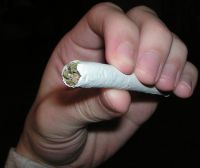
Help for vets?
There have been a raft of articles here recently about PTSD and veterans including one on the difficulty of diagnosing PTSD, the staggering number of new veterans seeking mental health care at the VA, and the both surprising and somewhat sobering news that younger veterans are more willing to ask for mental health care—this is sobering in that the number of Vietnam era veterans seeking mental health care might increase if they see a reduction in the stigma of asking for help.
Then, I saw this op-ed piece that accused the VA and the U.S. government of slow-rolling acceptance of medical marijuana into treatment regimens for veterans with PTSD. I’ll leave comments on the medical stuff to my colleague Cam Ritchie, a psychiatrist who served a career on active duty in the Army. But as a patient and someone still trying to work the VA system to get benefits and treatment for my PTSD (see my series on that here on Battleland under the sub-head Limboland.), I think there are some points I would like to comment on.
One of the most important issues for PTSD sufferers is control. When things are bad for me, it’s generally because I can’t control the images in my head, or the levels of my anxiety and fear, or my ability to sleep without nightmares. Some doctors I’ve spoken with tell me they don’t think medical marijuana is a valuable treatment because they believe it causes users to lose control. I suspect this is the same issue many doctors have with alcohol.
As a PTSD sufferer, alcohol proved quite useful as a sleep aid and as a way of helping me get control of the memories that flashed through my brain like images on a drive in movie screen. Sometimes I drank too much, and I often wished I had something else to use other than alcohol when the prescribed medications weren’t working well enough to clear my head of the horrific images and relax. Marijuana might have helped.
We’ve learned so much about treating blood and bone injuries in these recent wars. But the mind is sort of the final frontier. Psychiatrists and psychologists are still trying to understand what treatments work best for PTSD. The Defense Department has created the National Intrepid Center of Excellence (NICoE) at Bethesda for treating PTSD and Traumatic Brain Injuries. NICoE has taken an integrative therapy approach in which, it seems at least, the staff are willing to try pretty much anything to help their patients get well including integrative and complementary medicine.
Academic and research publisher Routledge is preparing a book tentatively titled Healing War Trauma. A Handbook of Creative Approaches, which will include chapters on using yoga, pets, SCUBA and other non-traditional approaches to treatment. The book is targeted at mental health care professionals.
I founded and run a small non-profit that provides no-cost writing seminars for veterans and family members as a way of helping them learn to tell their own stories. I’ve seen—both first-hand and from working with others in the seminars—the effect writing can have on our participants. Some psychiatrists pooh-pooh writing as therapy, but I know it helped me.
Any military leader can tell you that each person in their unit responds differently to various leadership styles. It’s certainly the case that individual patients will respond differently to various forms of treatment.
So what’s up with the VA and DoD ignoring the possibility that medical marijuana might actually help some of their patients? Looks political to me. But the point isn’t just about medical marijuana; it’s about finding individual treatment regimens for individual patients. When I was on active duty and we found some unique or at least non-standard solution to a vexing problem we would shrug and say “Hey, whatever works.” Maybe DoD and the VA should figure this out, too.


